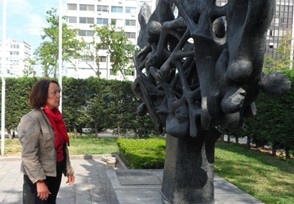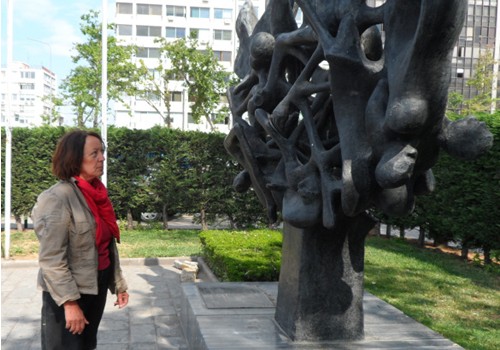
This Sunday, French expats in Israel can choose a member of parliament to represent the Left Front at the National Assembly in Paris: Michèle Parravicini. She can be elected next week to the French parliament, for a seat reserved for a lawmaker to represent the interests of French nationals living in Israel and seven other Mediterranean states.
The Left Front (French: Front de gauche – FG) is a French electoral coalition created by the French Communist Party (PCF) and the Left Party (PG, which was formed when a left-wing minority faction decided to leave the Socialist Party) and the Unitarian Left (Gauche Unitaire), a group which left the New Anticapitalist Party. In 2013, its constituent parties are, in addition to the two aforementioned parties: the Federation for a Social and Ecological Alternative (Fédération pour une alternative sociale et écologique, FASE), Republic and Socialism (République et socialisme), Convergences and Alternative (Convergences et alternative), the Anticapitalist Left (Gauche anticapitaliste), the Worker’s Communist Party of France (Parti communiste des ouvriers de France, PCOF) and The Alternative (Les alternatifs). The component parties of the FG decided to run a single, common candidate in the last year presidential election: the leader of the PG Jean-Luc Mélenchon, who officially announced his candidacy on 21 January 2011. On 5 June, the PCF’s national delegates approved, with 63.6% against 36.4%, a resolution which included an endorsement of Mélenchon’s candidacy as the Front’s candidate Mélenchon won 11.10%, or 3,984,822 votes, in the first round.

Michèle Parravicini in the Thessaloniki Holocaust Memorial on Freedom Square, Greece, May 2013 (Photo: Front de gauche)
Mélenchon and the FG’s platform in the 2012 presidential election were broken up into nine overarching axes:
- “Sharing the wealth and abolishing social insecurity” – banning market-based layoffs (licenciements boursiers) for companies which make profits, raise the minimum wage (SMIC) to €1,700, setting a maximum wage differential of 1 to 20 in all businesses, right to retirement with a full pension at 60, defending public services, stopping public sector spending cuts (RGPP), setting a maximum wage at €36,000, 35 hours workweek.
- “Reclaiming power from banks and financial markets” abolishing fiscal loopholes and privileges, taxing corporations’ financial revenues, creating a ‘public financial pole’ to reorient credit towards jobs, innovation and sustainable development.
- “Ecological planning” – to create a publicly owned energy sector, creating a national public water service, a new transportation policy promoting public transportation and taxing the transportation of non-vital merchandise.
- “Producing differently” – a new model of development which respects the environment and individuals, redefining industrial priorities, new rights for employees.
- “The Republic, for real” – creating a ministry for women and equality, regularizing illegal immigrants, opposition to the “golden rule” of fiscal balance, creating jobs in the public sector.
- “Convene a constituent assembly for the Sixth Republic” – convening a constituent assembly, repealing the 2010 local and regional government reform, proportional representation in all elections, reducing presidential powers and strengthening parliamentary powers, guaranteeing judicial and press freedom.
- “Repealing the Lisbon Treaty and creating another Europe” – proposing and adopting a new European treaty which would ‘prioritize social progress and democracy’.
- “To change the course of globalization” – withdrawing French troops from the occupation in Afghanistan, French withdrawal from NATO, recognizing the independence of a Palestinian state alongside Israel within 1967 borders, creation of a Tobin Tax to finance international development and cooperation and debt forgiveness for low-income countries.
- “Prioritizing human emancipation” – creating jobs in public education, spending 1% of GDP on arts and culture, doubling investment in research.
Since 2012, French expatriates send their very own regional constituency representatives to the National Assembly in Paris. This Sunday, French citizens living in Israel have the opportunity to elect their député, their own congressman. Last year’s election was annulled because the winner — Franco-Israeli Daphna Poznanski-Benhamou from the Socialist Party — was disqualified due to campaign funding irregularities, thus requiring the new vote.
The French diaspora is divided into 11 so-called conscriptions. Some of these regional groups consist of two countries. Others have many more — such as the tenth, which includes 48 countries in Africa and the Middle East. Israel is part of the eighth conscription, together with Italy, Turkey, Cyprus, Greece, Malta, San Marino and the Vatican.
Among the countries in its group, Israel has, by far, the largest number of French citizens. More than half of the eighth conscription’s 113,666 eligible voters are located here, which means that Franco-Israelis could have the decisive say in who gets elected. During the previous elections for French overseas residents, last June, only 7 percent of eligible voters in Israel cast a ballot (elsewhere participation was higher), and officials have little faith that the percentage will drastically improve this time around. About 150,000 French citizens reside in Israel, but more than half never registered with the French authorities and so cannot vote.


